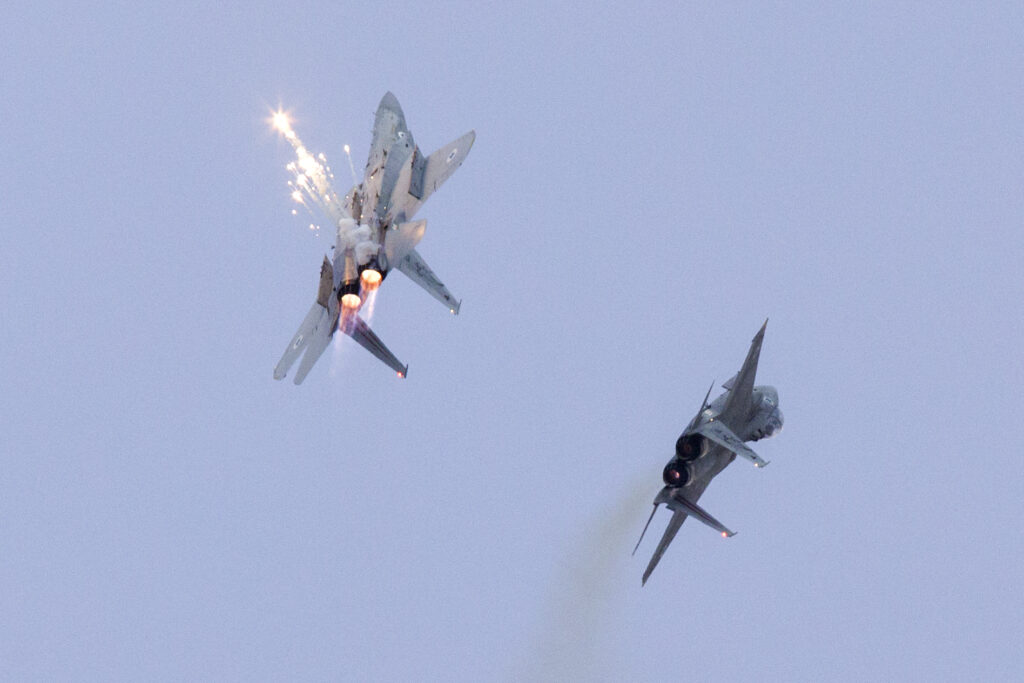
Two Israeli Air Force F-15 fighter jets pass close as one shoots off flares during a display at Hatzerim Air Force base outside Beersheba, Israel, 27 December 2017. An Israeli air show accompanied a graduation class of new pilots, the 175th in the history of Israel’s Air Force, which included one woman. EPA-EFE/JIM HOLLANDER
The dream of the mullah’s regime in Iran is to establish a Shia Crescent from Tehran to the Mediterranean Sea and to dominate the Middle East, if not the world entire. This is why Iran recently targeted the Saudi oil industry. This is why Iran is entrenching itself in Syria, Lebanon, Yemen and Gaza. This is also why Israeli governmental sources have reported that Iran-backed militias have established new headquarters, centers and training camps for a large number of new recruits alongside weapons and ammunition storage facilities in the Kataf region of Iraq. And now, Israeli governmental sources have reported on the existence of a new, important and vital site recently established for the Iraqi Al Najba militia, which is another Iranian proxy.
According to Israeli governmental sources, adjacent to the Euphrates River, there are a number of houses that are utilized for new Iranian proxy recruits and a large building alongside a weapons and ammunition storage facility that is heavily guarded by about 10 militiamen armed with Kalashnikov rifles, a RPG launcher, PK machine guns and launchers, grenades and hand grenades. This forested and densely populated site that is used by the Iranian proxies to train new recruits is considered to be one of the most important centers for the Iran-backed militias in Abu Kamal, Syria.
Israeli governmental sources reported that Iranian Revolutionary Guard Commanders routinely flock to this site. Upon the establishment of this base, about 100 new recruits were brought to the Iran-backed militias, who come from countries such as Syria, Iraq, Lebanon and even Afghanistan. The most prominent Iranian-backed instructors are within the Iranian Azadashir Camp.
According to Israeli governmental sources, there are a variety of weapons utilized in order to train the new recruits. They include 3 tanks, 2 BMW’s, shilka vehicles, 57 millimeter artillery, 130 millimeter guns, 23 millimeter machine guns, 12.7 millimeter machine guns and 14.5 millimeter machine guns. In addition, there are light and medium sized weapons alongside launchers and anti-tank shells.
Also, according to Israeli governmental sources, in one of the buildings, there is an intelligence office for the Iraqi Al Najba Militia, where civilian collaborators provide intelligence to the Iran-backed militias regarding what is happening in their regions. They also identify who is speaking out against the militias.
Israeli governmental sources reported that the mission of this office is to coordinate the information that is received on a daily basis and to send it to General Qassem Soleimani, the head of the Iranian Revolutionary Guards. The intelligence office includes six Iranians and six Shiite Syrians, who are fluent in the Persian language. They have state-of-the-art electric equipment, cameras and laptops. They also provide the collaborators with listening devices and hidden cameras.
According to Syrian Kurdish dissident Sherkoh Abbas, Iran will never abandon its desire for a Shia Crescent from the Persian Gulf to the Mediterranean Sea and the Red Sea because it is needed in order to keep their regime alive: “Since its inception in 1979, Iran’s regime promoted the rhetoric of anti-Western philosophy including being anti-US and anti-Israel by creating and supporting many extremist groups in the Middle East. Hence, Iran’s regime is based on anti-Western philosophy and hegemony in the region. If you take this away from it, that would be a beginning of an end to the Islamic Republic of Iran.”
For this reason, fighting against the Iranian regime is a number one priority for the State of Israel. Prime Minister Benjamin Netanyahu said last month that Iran has no immunity anywhere and that the Israeli military forces “will act – and currently are acting – against them.” Recently, Israel Hayom reported that airstrikes targeted the Iran-backed Popular Mobilization Forces near the Iraqi-Syrian border. One of the main reasons why Israel has not heavily responded to recent rocket fire from Gaza is because the Jewish state seeks to focus its resources upon fighting against the Islamic Republic of Iran and not to get itself distracted. Without the backing of Iran, Hamas is nothing more than a local terror group.
Mendi Safadi, the head of the Safadi Center for International Diplomacy, Research, Human Rights and Public Relations, is a lecturer and expert on Islamic affairs, terrorism, Syria and the Middle East. He has published numerous articles and served as a political and strategic adviser about the Arab Spring and the Syrian revolution. Previously, he was the chief of staff in the Office of the Deputy Minister for Development of the Negev and Galilee and Regional Cooperation in Israel. He served as a link between officials in the Israeli government and the Syrian opposition.